Here are the ways in which the US Midterms made history
THE US midterm election results are set to impact on the Trump administration in all sorts of ways, but the vote will also be remembered for the number of glass ceilings it managed to smash.
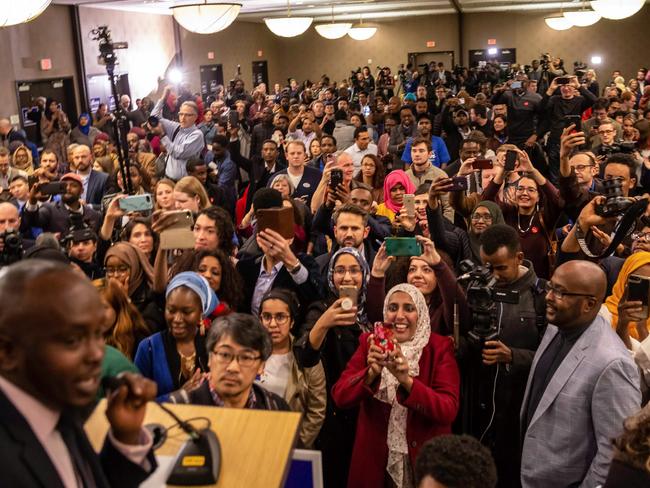
World
Don't miss out on the headlines from World. Followed categories will be added to My News.
THE topline result of the US midterm election - Democrats win the House, Republicans hang on to the Senate - obscures the fact that the election result made history in many other ways.
Although full data is not yet available, the midterm election seems to have attracted close to a record number of voters, and of those voters, more of them voted early - suggesting a sense of urgency - than ever before.
UPDATES: All the latest from the US Midterms
ANALYSIS: What the midterm results mean for Trump, and everyone
Here are some of the other ways in which the 2018 midterms made history
A RECORD NUMBER OF WOMEN WERE ELECTED

It looks like the next House of Representatives, the 116th, will easily have the highest number of female Representatives. The current record was 84, set in the 114th Congress (2015-2017).
With many races still to be called at the time of writing, it is projected that over 100 female Representatives will be elected, with the overwhelming majority of them Democrats. Though a record, women would still account for less than 25 per cent of the House’s 435 members.
Also, the first and only female Speaker of the House, Nancy Pelosi, will get her second go at the top job, having first held the role from 2007 until 2011.
- James Cahill
YOUNGEST WOMAN ELECTED TO CONGRESS

At 29, staunch left-winger Alexandria Ocasio-Cortez has become the youngest woman ever elected to Congress and one of the youngest members ever.
Until recently making ends meet as a bartender, Ocasio-Cortez scored an upset in a Democratic primary in New York City to defeat 10-term member Joe Crowley, one of the most powerful members of the party.
She easily won on Tuesday against a Republican in the heavily Democratic and ethnically diverse district straddling Queens and The Bronx.
A supporter of leftist Senator Bernie Sanders - who was also re-elected - Ocasio-Cortez has quickly become a national voice with her calls for a universal health care system, tuition-free public universities and the abolition of the US Immigration and Customs Enforcement, which has executed President Donald Trump’s campaign to deport undocumented immigrants.
- AFP
FIRST NATIVE AMERICAN WOMEN ELECTED TO CONGRESS
Democrat candidates Sharice Davids and Deb Haaland have become the first Native American women elected to Congress.
Sharice Davids
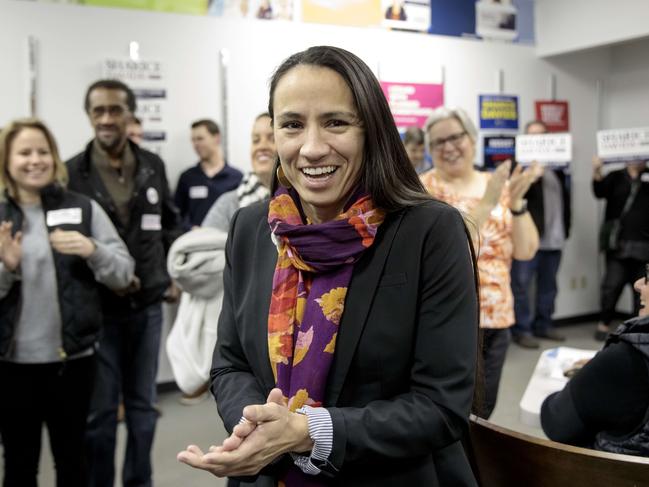
Davids, 38, of Kansas, is an lawyer by training and a former mixed martial arts fighter. She is also openly lesbian, in a state that is traditionally conservative. She defeated Republican incumbent Kevin Yoder.
The district she won is a mix of fast-growing commuter-belt towns, established suburbs and poorer city neighbourhoods.
Davids emerged from a six-person Democratic primary and energised voters and Democratic donors by emphasising her biography. Her history includes mixed martial arts fights.
She’s a member of the Wisconsin-based Ho-Chunk Nation and was raised by a single mother who served in the Army and worked for the US Postal Service.
Deb Haaland
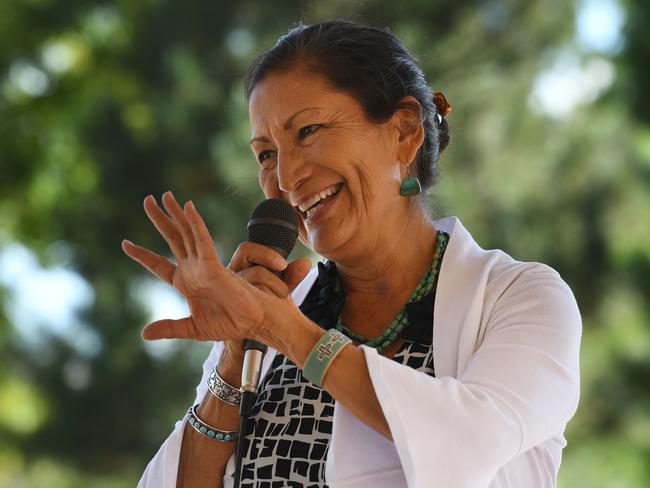
Haaland, 57, of New Mexico, beat Janice Arnold-Jones, a Republican, and Lloyd Princeton, a Libertarian.
The two women were among a record number of Native Americans who ran in the midterm elections for congressional seats, governor’s offices, state legislatures and other elected posts.
“Strong, Resilient, indigenous,” read the T-shirt worn by Davids in one of her campaign ads for election in the state’s 3rd congressional district, which includes Kansas City and its southern suburbs.
Haaland, a member of the Pueblo of Laguna tribe, is a well-known community activist in her solidly Democratic district, working tirelessly to encourage Native Americans - who make up two per cent of the US population - to vote.
She cut her teeth working as a volunteer for John Kerry’s presidential campaign in 2004 - making endless cold calls to rally Native Americans to vote.
Since then, she has not stopped campaigning: she worked full-time as a volunteer for Barack Obama, and on dozens of local and state campaigns. She ran for lieutenant governor and served one term as the state party chair.
“We need real people who are talking about our issues and know what it feels like,” Haaland told AFP in an interview ahead of the elections, in which she ran in New Mexico’s 1st congressional district seat.
“We have people in Congress right now who... don’t know what it’s like” to be without food or proper health care, she said.
She said although her disdain for President Donald Trump’s policies on immigration, health care and other issues motivated her to run, that was not the only reason.
- AFP
FIRST MUSLIM WOMEN ELECTED TO CONGRESS
A one-time Somali refugee and the daughter of Palestinian immigrants have become the first two Muslim women elected to the US Congress.
Both women - Ilhan Omar, 37, and Rashida Tlaib, 42 - are Democrats from the Midwest and outspoken advocates of minority communities that have found themselves in the sights of US President Donald Trump’s anti-immigrant policies.
Omar won a House seat in a strongly Democratic district in Minneapolis, Minnesota, succeeding Keith Ellison who was himself the first Muslim ever elected to Congress.
Tlaib’s victory was no surprise. She ran unopposed in a congressional district that stretches from Detroit to Dearborn, Michigan.
Their stories trace a similar trailblazing rise through local politics.
Ilhan Omar
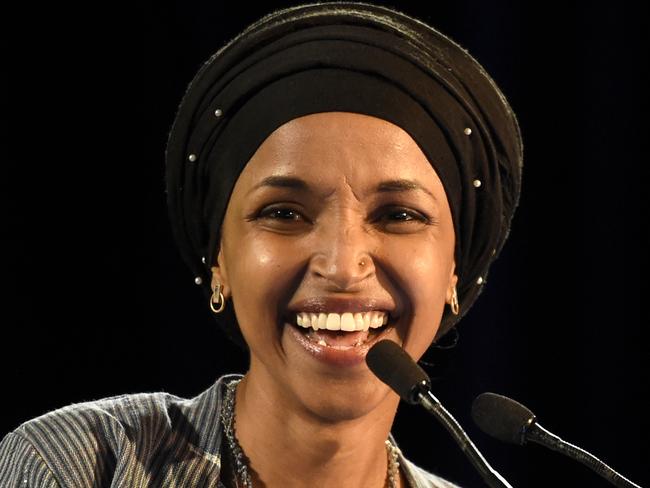
“I’m Muslim and black,” the hijab-wearing Omar said in a recent magazine interview.
“I decided to run because I was one of many people I knew who really wanted to demonstrate what representative democracies are supposed to be,” she said.
Omar fled Somalia’s civil war with her parents at the age of eight and spent four years at a refugee camp in Kenya.
Her family settled in Minnesota in 1997, where there is a sizeable Somali population.
She won a seat in the state’s legislature in 2016, becoming the first Somali-American politician in the country.
Before that, she had worked as a community organiser, a policy wonk for city leaders in Minneapolis, and as a leader in her local chapter of the NAACP - the African-American civil rights group.
She decided to run for Congress after Ellison, who is also black, decided to give up his seat after 12 years in Congress to run for Attorney-General of Minnesota.
Omar has forged a progressive political identity. She supports free college education, housing for all, and criminal justice reform.
She opposes Trump’s restrictive immigration policies, supports a universal health care system, and wants to abolish US Immigration and Customs Enforcement (ICE), which has conducted deportation raids.
Rashida Tlaib
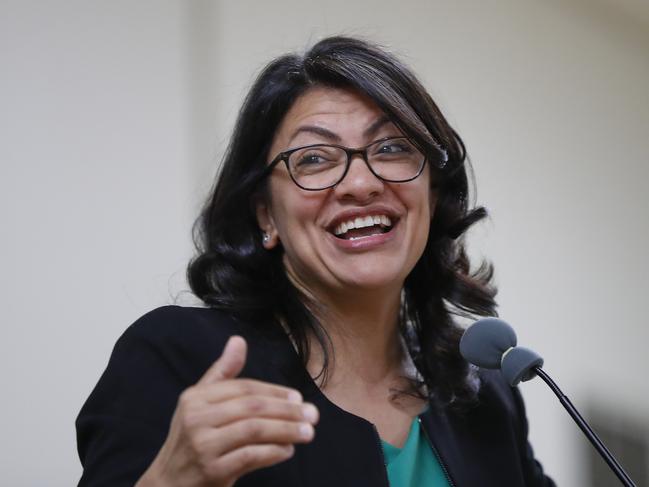
Rashida Tlaib is the Detroit-born daughter of Palestinian immigrants -- the eldest of 14 children.
A fighter who once heckled US President Donald Trump during a 2016 campaign stop in Detroit, she says she didn’t run to make history as Muslim.
“I ran because of injustices and because of my boys, who are questioning their (Muslim) identity and whether they belong,” Tlaib said in an US television interview in August.
“I’ve never been one to stand on the sidelines.”
Like Omar, she blazed a trail through Michigan politics, becoming the first Muslim woman to serve in the Michigan state legislature in 2008.
In August, she emerged as the winner of a Democratic primary for a seat vacated by John Conyers, a longtime liberal lion who stepped down in December amid sexual harassment allegations and failing health.
With no Republican challenger in the race, Tlaib’s election on Tuesday became a formality.
The seat she won is in a predominantly African-American congressional district with few Muslim voters.
She says her constituents were attracted to her progressive politics, which are the polar opposite of Republicans.
Tlaib has advocated for universal health care, a $15 national minimum wage, union protections, and tuition-free college education.
She also has been mindful of the historic nature of her candidacy. During her tearful primary election victory speech in August, with her immigrant mother by her side, she said relatives in the West Bank were watching her success.
“It just shows how incredibly wonderful our country can be,” she said.
Congressman Andre Carson, a Muslim-African-American, is also likely to win re-election in his safely-Democratic district in Indiana.
The milestone is a huge swing away from the rise in anti-Muslim sentiment in the US.
The Council on American-Islamic Relations (CAIR) reported a 21 per cent increase in anti-Muslim hate crimes in the first six months of 2018.
- AFP
FIRST OPENLY GAY MAN ELECTED GOVERNOR
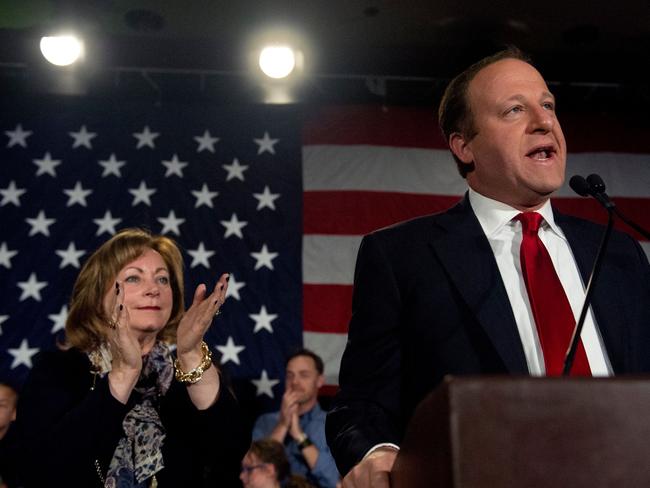
Jared Polis has won Colorado’s open gubernatorial seat to keep it under Democratic control.
Polis defeated Republican state Treasurer Walker Stapleton on Tuesday to succeed term-limited Democratic Governor John Hickenlooper.
Polis will become Colorado - and the USA’s - first openly gay governor.
He campaigned on universal health, renewable energy standards and publicly funded early childhood education. He also vowed to stand up to President Donald Trump’s efforts to dismantle the federal health care law.
Although often a swing state, Colorado has not had a Republican governor since 2007.
- AP
Originally published as Here are the ways in which the US Midterms made history


